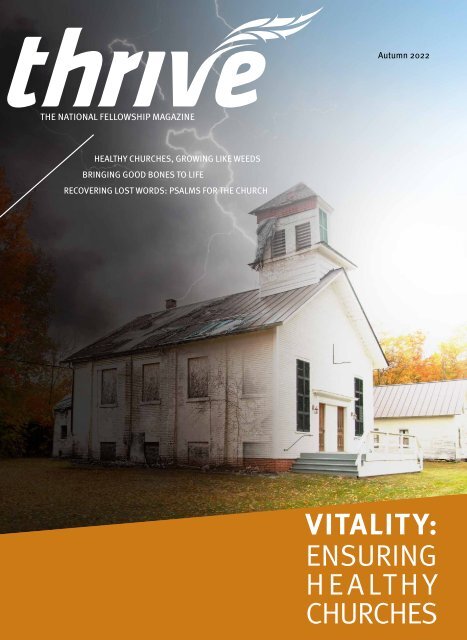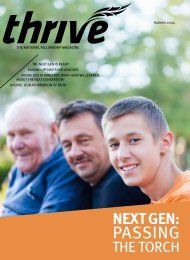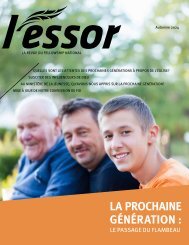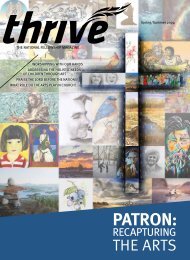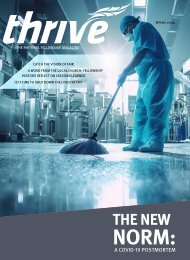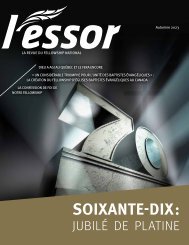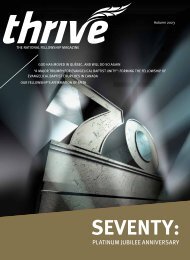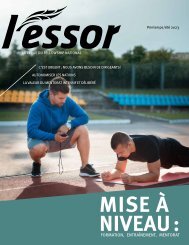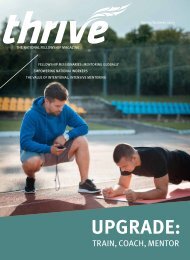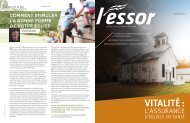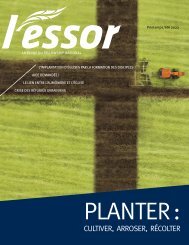Thrive - Fall 2022
VITALITY: Ensuring Healthy Churches
VITALITY: Ensuring Healthy Churches
You also want an ePaper? Increase the reach of your titles
YUMPU automatically turns print PDFs into web optimized ePapers that Google loves.
Autumn <strong>2022</strong><br />
HEALTHY CHURCHES, GROWING LIKE WEEDS<br />
BRINGING GOOD BONES TO LIFE<br />
RECOVERING LOST WORDS: PSALMS FOR THE CHURCH<br />
VITALITY:<br />
ENSURING<br />
HEALTHY<br />
CHURCHES
Autumn <strong>2022</strong><br />
I'VE BEEN TO THE<br />
MOUNTAINTOP<br />
by Steve Jones<br />
THE FIRST WORD<br />
In a recent conversation with five<br />
Regional Church Health Directors,<br />
I asked about the general health of<br />
our 500+ Fellowship churches. Their<br />
rough estimate was as follows:<br />
• Healthy or promising: 50-55%<br />
• Plateaued or stable: 25-30%<br />
• Declining or dying: 20-25%<br />
While these percentages were based<br />
on estimates rather than firm data,<br />
the reality is that we have much to<br />
do to support our local churches in<br />
returning to health and vitality.<br />
Church consultant George Bullard<br />
talks about the typical life-cycle of<br />
a church in North America. He said,<br />
“The average church that makes it<br />
seven years will have a lifespan of 80<br />
years.”<br />
The actual closing of churches is more common than you might think. Our own<br />
Fellowship member churches have numbered around 500 for the past two decades.<br />
Many churches have been planted during that time (87, between 1990 and<br />
2009 and 106 between 2010 and 2021), but many churches have also closed, and so<br />
our net gain is minimal. This is not ideal.<br />
Bullard identifies ten stages in the life-cycle of a church:<br />
• Birth<br />
• Infancy<br />
• Childhood<br />
• Adolescence<br />
• Adulthood (Apex)<br />
• Maturity<br />
• Empty Nest<br />
• Retirement<br />
• Old Age<br />
• Death
thrive-magazine.ca<br />
thrive / 3<br />
The “Moment” a local church decides<br />
that it…<br />
Needs a Mountain:<br />
This church, as it nears “adulthood” or<br />
“maturity”, needs to climb a new mountain<br />
together. It needs a fresh vision or<br />
the church will decline over the next<br />
three-to-five years.<br />
Needs an Intervention:<br />
This church has plenty of structure but<br />
less and less movement. Its traditions can<br />
choke out its life and reason (mission)<br />
for being. This church needs a Church<br />
Consultation, with an outside party to<br />
develop some prescriptions that will help<br />
redirect it back on mission. If not, the<br />
church will die sooner than later.<br />
So, what is my point?<br />
I recognize these are sobering words.<br />
Some declare we’re called to “faithfulness”.<br />
I certainly won’t disagree.<br />
However, this declaration only gets it<br />
half right. The Bible calls the Church<br />
to “faithfulness and fruitfulness”: lives<br />
that are won, discipled, transformed, and<br />
multiplied in others. Our church stats<br />
indicate we are experiencing only modest<br />
outcomes. What are we to do with that? I<br />
visit global fields where church planting<br />
movements and disciple-making movements<br />
stagger the imagination. But this is<br />
Canada. So, do we believe it can happen<br />
here?<br />
We all love the Church, the very bride of<br />
Christ. It is precious.<br />
Consider a Local Church Consultation<br />
Our Fellowship Regions have a ministry<br />
whereby they come alongside a<br />
Fellowship church, and consult and coach.<br />
The Church Consultation takes place over<br />
a weekend with key leaders and members<br />
in the church. Several solutions are<br />
identified and steps are determined for the<br />
church over the next one-to-three years.<br />
This intervention has been used by the<br />
Lord to help dozens and dozens of our<br />
churches pursue missional health.<br />
THESE PRINCIPLES SEEK TO<br />
RAISE UP VIBRANT GROUPS<br />
OF CHRIST FOLLOWERS WHO<br />
DEPEND ON GOD, PRAYING<br />
THEY MIGHT REPRODUCE<br />
THEMSELVES RAPIDLY<br />
THROUGH THE POWER OF<br />
THE HOLY SPIRIT.<br />
The Essential Element Principles<br />
Our own Fellowship International department has been training our Fellowship missionaries<br />
to pursue ten principles that will help advance mission.<br />
These principles seek to raise up vibrant groups of Christ-followers who depend on<br />
God, praying they might reproduce themselves rapidly through the power of the<br />
Holy Spirit. Spiritual seekers — or “people of peace” — form in groups called Discover<br />
Bible Studies (DBS), where they discover true life in Christ. This past year, almost 200<br />
DBS groups were formed in the fields where our Fellowship International missionaries<br />
serve. In fact, a couple of our missionaries have also implemented these principles<br />
through DBS groups in several of our churches in Canada.<br />
What’s the next step?<br />
Contact your Regional office to help your church start on the journey to vibrancy and<br />
health. For example, if you need information about conducting a Church Consultation,<br />
contact your Regional office. For more information on the Essential Elements, contact<br />
our Fellowship International Director Ben Porter (bporter@fellowship.ca).<br />
In this edition of <strong>Thrive</strong>, Vitality: Ensuring Healthy Churches, we will learn of stories of<br />
health and vitality within churches in Canada and beyond.<br />
Steven Jones<br />
is President of<br />
The Fellowship<br />
of Evangelical<br />
Baptist Churches<br />
in Canada. Follow<br />
Steve on Twitter @<br />
FellowshipSteve.
4 / thrive Autumn <strong>2022</strong><br />
THE FELLOWSHIP’S THEME VERSE<br />
DURING OUR "YEAR OF JOY" IN <strong>2022</strong><br />
IS: THE LORD YOUR GOD IS IN YOUR<br />
MIDST, A MIGHTY ONE WHO WILL<br />
SAVE; HE WILL REJOICE OVER YOU<br />
WITH GLADNESS; HE WILL QUIET<br />
YOU BY HIS LOVE; HE WILL EXULT<br />
OVER YOU WITH LOUD SINGING.<br />
ZEPHANIAH 3:17 (ESV)<br />
12 A MISSION TO REPLANT<br />
2 THE FIRST WORD<br />
I'VE BEEN TO THE MOUNTAINTOP / Steve Jones<br />
4 WHY SPONSOR A CHILD?<br />
5 FOUNDATION<br />
A FOUNDATION FOR YOUR GIVING NEEDS / Gord Baptist<br />
6 OUT THERE<br />
THE SECRET TO EXPLOSIVE CHURCH GROWTH<br />
IN COLOMBIA / Phil Webb<br />
HEALTHY CHURCHES, GROWING LIKE<br />
WEEDS / Richard Flemming<br />
8 LOVE EXTENDED<br />
UKRAINE RELIEF UPDATE / Paul Hildebrand<br />
BRINGING GOOD BONES TO LIFE / Denise Wicks<br />
12 GROUND WORK<br />
A MISSION TO REPLANT / Sergei Li<br />
JOIN A PRAYER MOVEMENT FOR QUÉBEC / Steve Jones<br />
STEPPING OUTSIDE THE WALLS / Larry Freeman<br />
14 TRUTH TALK<br />
RECOVERING LOST WORDS: PSALMS FOR<br />
THE CHURCH / Dr. David G. Barker<br />
16 UP TO SPEED<br />
THE UNEXPECTED PURSUIT OF A HEALTHY CHURCH / Jeff Bennett<br />
FELLOWSHIP PACIFIC: FOCUSSING ON CHURCH<br />
HEALTH / Mike Mawhorter<br />
KEEPING FEB CENTRAL CHURCHES<br />
HEALTHY / Rick Buck and Bob Flemming<br />
CHURCH REVITALIZATION NETWORKS / Tim Strickland<br />
FOSTERING VITALITY IN FRANCOPHONE<br />
CHURCHES / Jean-Philippe Lapierre<br />
BUILDING HEALTHY LEADERS ACROSS<br />
FELLOWSHIP ATLANTIC / Danny Barrett<br />
22 THE LAST WORD<br />
You can connect with us on FACEBOOK:<br />
www.facebook.com/thefellowshipca,<br />
on INSTAGRAM: @thefellowshipca,<br />
and on TWITTER: @thefellowshipca.<br />
Come and join the conversation.<br />
HOW TO BOOST YOUR CHURCH’S FITNESS LEVEL / Ed Fontaine<br />
MISSION STATEMENT: <strong>Thrive</strong> is the official magazine of The Fellowship of Evangelical Baptist Churches in Canada. It is published to enhance the life and ministry of church leaders and<br />
members in Fellowship congregations by providing articles, resources, and news that reflect evangelical values, a common mission, and a shared sense of identity and vision. <strong>Thrive</strong> is published<br />
three times per year and is available in English and French.<br />
© The Fellowship of Evangelical Baptist Churches in Canada<br />
MINISTRY CENTRE: P.O. Box 457, Guelph ON N1H 6K9<br />
T: 519-821-4830 F: 519-821-9829<br />
EMAIL: president@fellowship.ca<br />
thrive-magazine.ca<br />
SENIOR EDITOR: Steven Jones MANAGING EDITOR: Valerie Heaton<br />
COPY EDITOR: Jesskah McCartney LAYOUT & DESIGN: Ampersand<br />
EMAIL: thrive@fellowship.ca<br />
POSTAGE: Return undeliverable Canadian address to Circulation<br />
Department, P.O. Box 457, Guelph ON N1H 6K9<br />
WHY SPONSOR A CHILD?<br />
When you sponsor a child, you’re saying, “I believe in you,” and that has a huge impact<br />
on the children who are part of any of the Fellowship's five Child Sponsorship<br />
programs. Do you remember the last time someone said that to you? Didn’t it encourage<br />
you and give you a boost of confidence? Difficult tasks suddenly seemed much less<br />
daunting.<br />
You can give this same gift to children in the Dominican Republic,<br />
Honduras, Lebanon, and Sri Lanka by sponsoring a child. Scan<br />
the QR code or visit fellowship.ca/ChildSponsorship for more<br />
information.
A FOUNDATION FOR<br />
YOUR GIVING NEEDS<br />
by Gord Baptist<br />
foundation<br />
The following includes excerpts<br />
from Malcolm Burrows, who is<br />
at Philanthropic Advisory Service<br />
with Scotia Wealth Management.<br />
When charities were first required<br />
to register federally in 1967, over<br />
60% of organizations were religious<br />
and most were churches. In<br />
2013 in Canada, giving to religious<br />
charities represented 41% of all<br />
giving. As of January <strong>2022</strong>, Christian charities represent just<br />
29.7% of Canada‘s registered charities.<br />
Statistics Canada reported that in 2013 donors who attended<br />
religious services weekly gave an average of four times more<br />
per year than non-religious donors. Believers have a faith/<br />
value-based passion for regular charitable giving. We are<br />
trained to give.<br />
Yet in Canada we are just starting to see a shrinking base of<br />
donors that are feeling less connected to churches overall.<br />
Unfortunately, this is also true with some of our Fellowship<br />
churches. But, not all thankfully.<br />
This trend has implications for estate planning. Bequests<br />
to churches have traditionally been an important source of<br />
funding. With this decline in churchgoers follows a decline<br />
in estate donations.<br />
Consequently, individuals are increasingly looking to foundations<br />
to address their giving needs. This is why many have<br />
turned to the Fellowship Foundation for their estate planning<br />
needs. It provides a way for people to give confidently<br />
to various ministries, with the opportunity to re-evaluate<br />
their giving wishes if their situation changes.<br />
We at the Fellowship Foundation, in partnership with<br />
ADVISORS with Purpose, can help you create your own<br />
personal Will plan. If you have not yet made these arrangements,<br />
you can contact Fellowship Advancement Director<br />
Gord Baptist at 519-821-4830, ext. 244 (fax: 519-821-9829, or<br />
gbaptist@fellowship.ca) and we will walk you through the<br />
process.<br />
— Gord Baptist is Fellowship Advancement Director.<br />
FOUNDATION
Autumn <strong>2022</strong><br />
THE SECRET TO EXPLOSIVE CHURCH<br />
GROWTH IN COLOMBIA by Phil Webb<br />
OUT THERE: FELLOWSHIP INTERNATIONAL<br />
Many have asked what caused<br />
the success of church growth<br />
in Colombia. My wife, Deene, and<br />
I had the privilege of being part of<br />
this movement firsthand from 1987<br />
to 2013. Since then, we have continued<br />
to visit Colombia twice a year to<br />
encourage leadership. Those first 25<br />
years of the El Redil movement had<br />
various characteristics. El Redil means the “Sheepfold”, so<br />
each church is known for its shepherding qualities.<br />
The first El Redil church was planted in 1987 amongst university<br />
students and professionals. In a city of 2.5 million<br />
there were only a few other churches targeting the middle<br />
and upper classes. We did an extensive job of studying the<br />
cultural and spiritual state of the city and recognised some<br />
glaring needs within the Evangelical church. Within Latin<br />
church culture, leadership is traditionally held within a<br />
select group of people. The Evangelical church continued<br />
to have strong hierarchical structures that did not facilitate<br />
leadership development. In the first years, we were challenged<br />
by Leith Anderson's quote:<br />
“LEADERS WHO FINISH WELL<br />
ARE NOT THOSE WHO RUN<br />
THE LAST RACE BEFORE THE<br />
TRACK LIGHTS ARE TURNED OFF.<br />
LEADERS WHO FINISH WELL ARE<br />
THOSE WHO PASS THE BATON<br />
TO THEIR SUCCESSORS TO RUN<br />
THE NEXT LEG OF THE RACE.<br />
BLESSED ARE THOSE WHO MAKE<br />
THEIR SUCCESSORS SUCCEED.”<br />
In response, instead of holding onto leadership, the<br />
churches intentionally sought to get rid of the “caudillo”<br />
(strong lone ranger) pastoral style. People were surprised<br />
that there were no protagonists within our public meetings.<br />
Leadership was shared and no one person became the<br />
focus. Team leadership has allowed us to face mistakes —<br />
which have been many — much quicker.<br />
If we were going to believe in and practice the priesthood<br />
of all believers, leadership had to set the example in allowing<br />
themselves to be ministered to by others. Vulnerability<br />
was the road less travelled, but the only road to change in<br />
Latin church culture. We tend to feel able to wash the feet<br />
of others, but find it hard to allow our feet to be washed.<br />
Church culture does not change unless leadership is willing<br />
to practice what is being preached. In order for a movement<br />
to occur, continual evangelism and discipleship must<br />
occur. Trust must be placed in each believer’s ability to<br />
share with and care for others. Last of all, the prayers of all<br />
believers is recognized as paramount in the life and growth<br />
of the church.<br />
The DNA of the El Redil churches has always been to start<br />
new churches once they get to a certain number. We never
thrive-magazine.ca<br />
thrive / 7<br />
planned to be a mega church, therefore we knew that we needed<br />
to train up new leadership for new plants. All the churches<br />
that have been started by El Redil give back 10% of all offerings<br />
in order to help with leadership training and new church<br />
plants. Today we are a group of 18 churches with 60 or so leaders<br />
being trained to be elders and future pastors.<br />
Longevity of leadership allows for crucial DNA to be passed<br />
on to the second and third generations. We have lost very few<br />
leaders to moral, mental, or spiritual decay. I am also thankful<br />
to say that we have had very few burnouts, because with shared<br />
leadership there is also reciprocal care and shepherding.<br />
The unity amongst the pastors from the 18 churches is critical<br />
for the DNA to continue. This demands time taken to meet<br />
as pastoral couples every month or so. This may seem like a<br />
superfluous gathering, but this is where DNA is passed on and<br />
protected. Most of these 18 churches are already planning for<br />
their next plant.<br />
Let me conclude this brief explanation by noting that expositional<br />
preaching is one more factor that has helped churches<br />
stay focused, and is where the balance between truth and grace<br />
has protected them from the legalism and abuse which is prevalent<br />
in Latin America. Today the El Redil churches are helping<br />
many independent churches and other denominations to understand<br />
what healthy leadership and, in turn, healthy church<br />
life can look like. It’s God’s grace working through each of these<br />
factors that has allowed the Church in El Redil to thrive.<br />
— Phil Webb is a Fellowship International missionary working<br />
with the El Redil churches in Colombia, and Regional Coach<br />
in Leadership Health and Development for the Fellowship<br />
Prairies Region.<br />
HEALTHY CHURCHES,<br />
GROWING LIKE WEEDS<br />
by Richard Flemming<br />
Anyone who enjoys gardening knows about weeds. Left on their own they can quickly become the unintended<br />
feature of our flower beds. The rapid progression of weeds alerts us to an uncomfortable reality:<br />
just because it grows doesn’t mean it’s healthy. Just ask anyone battling cancer! By their nature, disciple-making<br />
movements produce healthy churches that multiply quickly. While several reasons could be offered as to<br />
why this is the case, let me mention two that immediately come to mind.<br />
Nowhere to hide<br />
Trevor Larson has been serving in Indonesia as a movement leader for almost 30 years. To date, along with his<br />
team of dedicated Indonesian workers, they have seen 350,000 Muslims come to Christ, forming 70,000 groups<br />
that meet regularly around God’s Word. Do the math and that works out to five people per group. According to proximity, several<br />
groups join together to form churches. It’s not hard to imagine that in a group setting like that, it would be difficult for participants<br />
to hide the true condition of their hearts. House churches, the model of preference for disciple-making movements, leave little room<br />
for regular attenders who we might label as “adherents.” God’s people gathering in small groups around God’s Word is not a place of<br />
comfort for weeds.<br />
Teach them to obey<br />
One of the important qualifiers of disciple-making that Christ left His followers is found in<br />
Matthew 28:20. “Teaching them to observe all that I have commanded you” (ESV) is all about<br />
practicing obedience to the Lord’s commands, not just knowing about them. This significant<br />
emphasis on obedience to God’s Word characterizes DMM churches. Here we find a vital metric<br />
of church health that is often neglected in our current measurements. It stands to reason<br />
that a room full of people is not in itself an indication of health any more than a flower bed<br />
full of weeds would be.<br />
Churches that are part of these disciple-making movements are far from perfect. However,<br />
just like the gardener who regularly attends to those annoying weeds, so the makeup of these<br />
small groups of Christ-followers act as landscapers hoeing out those unwanted plants thus<br />
making room for the healthy ones to flourish.<br />
Today, these God-driven movements are producing healthy churches and they are multiplying<br />
like weeds!<br />
— Richard Flemming is Fellowship National's Eastern Coordinator.
love extended<br />
Autumn <strong>2022</strong><br />
UKRAINE<br />
RELIEF<br />
LOVE EXTENDED: FAIR<br />
UPDATE by Paul Hildebrand<br />
Since the Russian invasion of<br />
Ukraine began on February 24,<br />
<strong>2022</strong>, our Fellowship International<br />
missionaries living in Poland, along<br />
with many partners, have been providing<br />
emergency care for refugees<br />
arriving in Poland and supporting<br />
churches in Ukraine as they continue<br />
to care for their communities.<br />
In the first phase of FAIR's emergency response (March to<br />
April), our main priority was caring for refugees arriving in<br />
Poland. Two of our church partners ran emergency shelters<br />
out of their church buildings near the Ukrainian border.<br />
They provided refugees with fresh food and a place to rest<br />
after their long journey. One of the church members in<br />
Zamość is a widow with boundless energy and deep faith<br />
in Jesus. She brings a sense of welcome and peace to each<br />
family. When a refugee family arrives, she greets them all<br />
with a big hug, tells them that Jesus loves them, and gives<br />
a Bible to each child. This welcome and the care provided<br />
were especially helpful to all the mothers who escaped<br />
Ukraine with their children, arriving fatigued from their<br />
difficult journey, and filled with worry about their husbands<br />
who remained back in Ukraine.<br />
This summer, FAIR entered phase two of its emergency response.<br />
Because the number of refugees arriving in Poland<br />
decreased significantly, the main priority was to help<br />
refugees settle into medium-term housing and to send food<br />
aid into Ukraine. Another of our church partners in Poland<br />
was introduced to some refugees who were elderly or had<br />
disabilities, which put them in extra vulnerable situations.<br />
To help these refugees they provided them with a safe place<br />
to live, including the purchase of an apartment using the<br />
money they had saved for a church building renovations,<br />
and financial assistance from FAIR.
thrive-magazine.ca<br />
thrive / 9<br />
HELPING AT THE<br />
POLISH BORDER<br />
We also have partnerships with Operation Mobilization, numerous<br />
churches, and chaplains serving throughout Ukraine who regularly<br />
need food aid. They are feeding and caring for many displaced<br />
people in Western Ukraine, Ukrainian Christians regularly need<br />
food and fuel support to continue. The large food shipments from<br />
the UN were mainly sent to Eastern Ukraine, making our food aid<br />
vital for Ukrainian churches in Western Ukraine who are caring<br />
for their communities where other sources of aid were slow in<br />
coming.<br />
We are grateful that God has called so many churches and<br />
individuals to give generously to this emergency response. By<br />
the end of April, nearly $1,200,000 was raised. This past summer<br />
we were praying for an additional $750,000 to continue<br />
to provide aid to those who have lost so much as the war<br />
continues.<br />
— Paul Hildebrand is a FAIR Projects and Promotion<br />
Coordinator.<br />
In March, a team of volunteers<br />
from Fellowship churches in BC,<br />
led by April Christensen, went to<br />
the Polish/Ukrainian border to join<br />
in the work being done by Fellowship<br />
International missionaries. In the past,<br />
they had worked with Pierre Jutras in his<br />
camp ministry, and so out of their love<br />
for Pierre, they wanted to go help. When<br />
they arrived, they served at two emergency<br />
shelters operating out of churches near the<br />
Ukrainian border. Seeing how weary the<br />
church members were in caring for the flood<br />
of refugees, they immediately began caring for<br />
many of the 'behind the scenes' tasks necessary<br />
to keep the shelters operational, providing<br />
the local volunteers with to rest and be restored.<br />
Their time was filled with prayer and service meeting<br />
many practical needs.<br />
To inquire about possible volunteer opportunities,<br />
please email international@fellowship.ca.
10 / thrive Autumn <strong>2022</strong><br />
BRINGING<br />
TO<br />
GOOD BONES
thrive-magazine.ca<br />
thrive / 11<br />
LIFE<br />
by<br />
Denise Wicks<br />
Have you ever had a season in your life when you<br />
had no meaningful occupation – whether paid or<br />
unpaid? Perhaps it was because of an illness or loss of<br />
employment. Maybe it started out as a relief because<br />
you needed the break from a stressful job or time to<br />
heal. But with every passing day, new feelings began to<br />
surface: boredom, worry, discouragement… losing hope<br />
that your circumstances would change.<br />
For many of us, we return to our normal occupations<br />
after such a season. But for many boys in Lebanon, this<br />
is a daily reality with little likelihood of ever changing.<br />
The people of Lebanon have been hit hard by a series of<br />
unfortunate events. The country was already experiencing<br />
political, economic, and social instability exacerbated<br />
by the hundreds of thousands of Syrian refugees who<br />
sought shelter from the civil war in their home country.<br />
Then the COVID-19 pandemic and the Beirut port explosion<br />
in August 2020 caused hyperinflation to settle<br />
in. Most businesses have either closed or are struggling<br />
to stay open. Jobs are extremely challenging to find.<br />
Fellowship International missionary Karim Anayssi<br />
tells the story of a young man named Mohammed,<br />
whom he met while out in the community around<br />
Cedar Home in Lebanon. Every day that Karim went<br />
out, Mohammed was at the same place, standing by garbage<br />
cans. He told Karim that his father pulled him out<br />
of school and told him to pick through the trash to try<br />
to find things that they could sell or use for their family.<br />
Every day he goes out to wait for people to drop their<br />
trash off at the garbage cans.<br />
It’s young men like Mohammed that Karim dreams of<br />
helping, and he’s in the unique position to do just that!<br />
Karim serves as the executive director of Cedar Home.<br />
One of the assets he oversees is a building located<br />
outside the city. Abandoned during the Lebanese civil<br />
war, and previously home for Cedar Home, shows the<br />
scars of the decades it has stood empty. But it does still<br />
stand – straight and tall amongst the hills. Despite bullet<br />
holes on the outside and broken furniture and debris<br />
within, it has “good bones” – and the potential to bring<br />
hope to young people again.<br />
Karim dreams of bringing those “good bones” to life<br />
again, taking the old building and making it into a<br />
school for boys to provide them with the opportunity<br />
to learn trades like plumbing and electrical work so<br />
they will have “in demand” skills, and to demonstrate<br />
and share the love of Christ with them so they will gain<br />
hope in Christ. Then they would be sent out to apprentice<br />
and work in their community, bringing the Good<br />
News with them.<br />
FAIR wants to make Karim’s dream a reality.<br />
Through the Good Bones special appeal, FAIR is<br />
seeking to raise $150,000 to repair, renovate, and<br />
outfit the old Cedar Home building. Funds will be<br />
used to make the home ready to accept both residential<br />
and non-residential boys into the program. You<br />
can partner with us in this life-changing ministry opportunity<br />
on our website: fellowship.ca/GoodBones<br />
With your help, we can bring “good bones” to life,<br />
bringing hope for the future and the light of the Gospel<br />
in its wake.<br />
— Denise Wicks is a FAIR Projects and Promotion<br />
Co-coordinator.<br />
Please join us in praying these verses over the Good Bones project and the boys who will be<br />
impacted by its success.<br />
“YOU ARE THE LIGHT OF THE WORLD. A TOWN BUILT ON A HILL CANNOT<br />
BE HIDDEN. NEITHER DO PEOPLE LIGHT A LAMP AND PUT IT UNDER A<br />
BOWL. INSTEAD THEY PUT IT ON ITS STAND, AND IT GIVES LIGHT TO<br />
EVERYONE IN THE HOUSE. IN THE SAME WAY, LET YOUR LIGHT SHINE<br />
BEFORE OTHERS, THAT THEY MAY SEE YOUR GOOD DEEDS AND GLORIFY<br />
YOUR FATHER IN HEAVEN.” MATTHEW 5:14-16 (NIV)
ground work<br />
Autumn <strong>2022</strong><br />
A MISSION<br />
TO REPLANT<br />
In October 2020, Zach Lautsen and Aaron Murray moved<br />
to Québec from Sioux Lookout, ON. When they came,<br />
provincial restrictions were strict – yet they came to learn<br />
French and the culture, and to discern their calling. Zach<br />
is a flight specialist and Aaron was a youth pastor; both are<br />
now full-time missionaries in Québec, serving in churches<br />
that are in the midst of the replanting process. Their goal<br />
is to help give life and support to new churches plants and<br />
those churches that are being replanted. When a church<br />
reaches a phase of waning growth and/or decreasing numbers,<br />
they are faced with the prospect of closing their doors<br />
entirely. Here in Québec, many such churches have engaged<br />
in the process of replanting their church – re-establishing<br />
the church’s mission, vision, and direction, setting<br />
them on a path towards church health.<br />
Over the past two years, Zach and Aaron were able to<br />
learn French and develop a strong desire to reach the rural<br />
areas of Québec with the Gospel. It’s been pure joy for<br />
me to see their heart for Québec grow every month, and<br />
to watch them work hard at learning a foreign language<br />
by Sergei Li<br />
alongside their families. Their love for reaching French<br />
Canadians shows in both their efforts to learn the language<br />
and in answering God’s call to minister in the rural<br />
area of Chicoutimi, QC. They worked together with the<br />
current leadership at the Chicoutimi church with humble<br />
hearts, providing much-needed support during the<br />
church’s replanting process. Zach and Aaron are now in<br />
Verdun, QC, serving in another local church engaging in<br />
the replanting process.<br />
As the needs in Québec grow and as our pastors age, we’re<br />
encouraged to see missionaries from Canada come and do<br />
the hard work of learning the language, the culture, and<br />
helping to plant and replant churches<br />
in Québec for God’s glory. Join us in<br />
praying for more young people, individuals,<br />
and families to come serve in<br />
Québec, for the glory of God.<br />
—Sergei Li is Fellowship National's<br />
Francophone Ministry Coordinator<br />
GROUND WORK: FRANCOPHONE AND CHAPLAINCY MINISTRIES<br />
JOIN A PRAYER MOVEMENT FOR QUÉBEC<br />
by Steve Jones<br />
In recent years a prayer movement was started, praying for Québec 24 hours a day, 7 days a week. I<br />
became aware of it when I heard alarms go off on the watches and Smart phones of Québec leaders<br />
at 10:02 am during our meetings. It was a reference to Luke 10:02 (NIV): “He told them, ‘The harvest is<br />
plentiful, but the workers are few. Ask the Lord of the harvest, therefore, to send out workers into his harvest<br />
field’.”<br />
A growing number of Fellowship Francophone brothers and sisters are praying that God will bring “times<br />
of refreshing” (Acts 3:19) to our Québec region and more workers from around Canada and the world to<br />
share in the work of reaching people for Christ. Currently there are 297 people who persevere in prayer one<br />
hour each week. They gather in 14 prayer small groups each month, and commit to fast and pray for one day<br />
for Québec. An invitation is going out to all of English-speaking Canada to join this prayer movement. Steps<br />
are being taken to get the information concerning this prayer movement translated into English. This information<br />
will be available on our website sometime in autumn <strong>2022</strong> outlining the movement and how to join.
thrive-magazine.ca<br />
thrive / 13<br />
STEPPING<br />
OUTSIDE<br />
THE WALLS<br />
by Larry Freeman<br />
Do you ever get the feeling that<br />
you are being watched? Under<br />
some circumstances this might<br />
be a bit creepy, while in other<br />
circumstances that is the hope<br />
and desire. When Jesus called His<br />
disciples, He said, “Follow me,<br />
and I will make you fishers of<br />
men” Matthew 4:19, ESV. The idea<br />
in these words is that while they were following Him,<br />
they would observe and listen with the goal of learning<br />
how to become fishers of men.<br />
Those words still hold true for the call to discipleship<br />
today. A number of our pastors in Québec, as well as<br />
other parts of Canada, have stepped outside the walls of<br />
their offices and their churches to model for their people<br />
how to become “fishers of men”, remove boosting their<br />
church’s overall health through fostering a culture of<br />
discipleship. Éric Leblanc (Cowansville, QC) serves as a<br />
Fellowship chaplain at the food bank run out of Église<br />
Évangélique Baptiste de Cowansville. He writes: “In this<br />
way, they (those who utilize the foodbank) discover<br />
God’s love for them in Jesus through the love that I<br />
and my team show them. This has encouraged some<br />
members of our church to get involved in the ministry.”<br />
Healthy churches have increasingly involved members.<br />
Fellowship chaplain François Provencher (Granby,<br />
QC) writes: “In our church we have several chaplains<br />
who are involved in the community… The members of<br />
our church pray for each of us… Church members see<br />
Sunday morning visitors in connection with the different<br />
areas of chaplaincy, which is encouraging for the<br />
church.”<br />
Serge Caron, a pastor and a Fellowship chaplain who<br />
works with parolees, sums it up with these words:<br />
“Chaplains who work with the released not only bring<br />
hope to these ex-detainees, but also encourage church<br />
members when they see them attend Sunday worship.<br />
These are powerful testimonies that remind us that<br />
God is present everywhere, whether in prison or on the<br />
street.”<br />
— Larry Freeman is Fellowship Chaplaincy Coordinator.<br />
GOD IS PRESENT EVERYWHERE,<br />
WHETHER IN PRISON OR ON THE STREET.
truth talk<br />
Autumn <strong>2022</strong><br />
by Dr. David G. Barker<br />
TRUTH TALK: THEOLOGY AND TRENDS<br />
CHURCH HEALTH IS ABOUT<br />
VITALITY AS WELL AS STRUGGLE;<br />
COME-BACK CHURCHES AS WELL AS<br />
DYING CHURCHES. THE CHURCH LIFE<br />
CYCLE TALKS OF INFANCY, GROWTH,<br />
REDEVELOPMENT, AND AGING. THE<br />
AVERAGE NORTH AMERICAN CHURCH<br />
LIVES AND DIES WITHIN 75 YEARS.<br />
A HEALTHY THEOLOGY OF CHURCH<br />
HEALTH PRACTICE MUST ALSO INCLUDE<br />
LAMENT. HERE DR. DAVID G. BARKER<br />
REMINDS US ABOUT THE IMPORTANCE OF<br />
THE LAMENT PSALMS.<br />
In recent studies of the Psalms many have come to<br />
believe that the movement away from the psalms in<br />
general, and the lament psalms in particular, is a loss<br />
for both theological truth and authentic worship in<br />
the twenty-first century-church.<br />
Two factors play into this. First, the apostle Paul said,<br />
"Speak to one another in psalms, hymns, and spiritual<br />
songs" (Ephesians 5:18; cf. Colossians 3:16 AMP). If<br />
Paul thought that the psalms were beneficial to the<br />
first-century church, how can we think they are not<br />
beneficial for the twenty-first-century church?<br />
When we think of the 150 psalms in the book of<br />
Psalms, we are taken from the amazing glory of God to<br />
the deepest depths of lament. In no other place do we<br />
find such an all-encompassing collection of worship
thrive-magazine.ca<br />
thrive / 15<br />
songs. And they are God-breathed Scripture. No contemporary<br />
song or ancient hymn can make this claim.<br />
Second, we have avoided the psalms of lament. It is surprising<br />
to many Christians that lament psalms comprise the largest<br />
category of psalms in Psalms. With this omission, we have lost a<br />
crucial voice of spirituality and worship.<br />
Yes, as Christians we have hope like no others. But we live in<br />
the now-but-not-yet. Death is still an enemy. There is a day coming<br />
when all tears will be wiped from our eyes, but not yet. We<br />
don't grieve like others with no hope, but we still grieve, and<br />
lament psalms give us a voice.<br />
How do we bring lament back into the church? The answer<br />
is simple: read all the psalms, and all the verses in them (i.e.<br />
don't skip vv. 19-22 in Psalm 139). For centuries reading a psalm<br />
was part of the church's worship. But in recent times we have<br />
chosen to do differently. We have come to believe that church<br />
services need to be uplifting and positive. Psalm 88 is a tough<br />
read in these kinds of services.<br />
Fellowship National President Steve Jones designated <strong>2022</strong> as our<br />
"year of joy" (Zephaniah 3:17). Perhaps it would be good to reflect<br />
on from where joy comes. Yes, the psalmist said, "Rejoicing comes<br />
in the morning." But why the morning? Because in the previous<br />
line he said, "Weeping may stay for the night" (Psalms 30:5 NIV).<br />
Almost one third of Psalms is given to the<br />
lyrics needed for that night of weeping. We<br />
all know that the darker the night is, the<br />
brighter is the dawn.<br />
— Dr. David G. Barker is Professor<br />
Emeritus of Biblical Studies at Heritage<br />
College and Seminary in Cambridge, ON.
Autumn <strong>2022</strong><br />
THE UNEXPECTED<br />
PURSUIT OF A HEALTHY<br />
CHURCH<br />
by Jeff Bennett<br />
UP TO SPEED: REGIONAL UPDATES<br />
Lead pastor. Growing attendance.<br />
Small groups and community.<br />
But there was a question that repeatedly<br />
pulsed within my heart: “How<br />
many times have you, and the people<br />
in your church, shared the Gospel?”<br />
I knew the number must be low,<br />
which exposed a lack of priority in<br />
sharing the Gospel. God’s presence<br />
in my church was graciously apparent in many ways, but I<br />
could no longer ignore the reality that I had not equipped<br />
the church well to pursue the lost. My mind agreed that the<br />
harvest is plentiful. My heart longed to see a plentiful harvest.<br />
So, my decision was to simply grow my ability to share.<br />
The plan? From 10:00 a.m. to 5:00 p.m. across 15 days, I<br />
knocked on doors and engaged people on the streets alongside<br />
a new friend from the UK. It felt awkward and a little<br />
bizarre. Yet as days passed, I was surprised by how God had<br />
gone before us, how open people were to receive prayer or<br />
hear the Gospel, and how fast this new habit became routine.<br />
Joining someone else who helped me see beyond my current<br />
perspective was essential toward me making progress in<br />
Gospel witness.<br />
The fruit? An even greater longing for the lost, clarity<br />
to obey Scripture, and willingness to die to self. I didn’t<br />
return home with a new method, but with a renewed<br />
heart that compelled me to go share truth, instead of only<br />
defending it (Mark 16:15). I began spending time every<br />
week proactively engaging people with the Gospel and<br />
prayed for others to join me.<br />
Three years later, we have a team who inspires one another<br />
to engage the harvest weekly and seeks to model evangelism<br />
as normal obedience. God has moved believers from<br />
many places to join in conversation and evangelism with<br />
us. We are seeing regular baptisms and churches started.<br />
We’ve learned that church health isn’t triggered by human<br />
ingenuity but through ordinary, surrendered hearts<br />
that have counted the cost at salvation, and every day after.<br />
We’ve learned that we need one another for perspective,<br />
encouragement, and accountability. If God has already spoken,<br />
then we can go out with kindness, with boldness, and<br />
just as we are to share the truth of who He is.<br />
Are you ready to take the next step? “The harvest is plentiful,<br />
but the workers are few” (Luke 10:2 NIV). Join us at<br />
harbourfellowship.com for resources, upcoming in-theharvest<br />
times, and to connect with people who can help you<br />
make room for the Gospel in new ways in your own heart.<br />
— Jeff Bennett is Lead Pastor of Harbour Fellowship<br />
Church in St. Catharines, ON.
thrive-magazine.ca<br />
thrive / 17<br />
FELLOWSHIP PACIFIC:<br />
FOCUSSING ON CHURCH<br />
HEALTH by Mike Mawhorter<br />
What is church health? As difficult as it may be to define,<br />
healthy churches are why the Fellowship exists. Our<br />
vision at Fellowship Pacific is “to innovatively develop relationships<br />
and resources that propel every Fellowship Pacific church to<br />
be accountable to their Gospel mandate.” The wording and even<br />
the order of wording is significant. We value innovation in<br />
the resources and service we provide, always asking how we<br />
can do it better. Relationships are key – between churches and<br />
Fellowship Pacific, but church-to-church as well. And we want<br />
the resources we develop to support and inspire churches in<br />
their mission.<br />
Some of the resources we provide include helping develop mission,<br />
vision, and values; providing a discipleship framework<br />
for churches to design and implement their own discipling<br />
strategy; board training to equip board members to lead effectively;<br />
team building for staff and boards; consultations to help<br />
a church do a deep-dive into their culture and ministries; EQ<br />
Bootcamps to help pastors and leaders improve their Emotional<br />
Intelligence; as well as crisis support, pastoral care, and assistance<br />
to search teams.<br />
As we currently reimagine how we can best serve our churches,<br />
we are shifting priorities in two directions. First, we are moving<br />
away from simply presenting content to a greater emphasis on<br />
coaching. All our staff are getting coaching certification. We are<br />
also working to develop the resources we offer into asynchronous<br />
seminars involving video content, group interaction, and<br />
ongoing coaching.<br />
Second, we are emphasizing more church-to-church involvement,<br />
so that people don’t just look to the Fellowship Pacific<br />
Regional office for help. There is a gold mine of wisdom, experience,<br />
and creativity in our churches. The challenge is how to<br />
discover those resources and make them accessible. We are currently<br />
working on a platform to better facilitate this.<br />
Recently a church contacted us for a survey to give their congregation<br />
as they look for a new pastor; we were able to send them<br />
a survey from another church. A different church is struggling<br />
to survive; two churches in their part of the province have come<br />
forward to offer help and support. This kind of interdependence<br />
can enhance the health of both the giving<br />
and receiving churches. And church<br />
health is what we are all about.<br />
— Mike Mawhorter serves on the<br />
Fellowship Pacific Connect team, where<br />
he is responsible for pastoral placement<br />
among other ministries.<br />
RELATIONSHIPS ARE KEY –<br />
BETWEEN CHURCHES AND<br />
FELLOWSHIP PACIFIC, BUT<br />
CHURCH-TO-CHURCH AS<br />
WELL. AND WE WANT THE<br />
RESOURCES WE DEVELOP<br />
TO SUPPORT AND INSPIRE<br />
CHURCHES IN THEIR MISSION.
18 / thrive Autumn <strong>2022</strong><br />
KEEPING FEB CENTRAL<br />
CHURCHES HEALTHY<br />
by Rick Buck and Bob Flemming<br />
UP TO SPEED: REGIONAL UPDATES<br />
Helping churches thrive on mission by maximizing<br />
their ministry impact and sharpening their effectiveness<br />
to make disciples – that is FEB Central’s Church<br />
Health mission, and here are just a few of the ways we accomplish<br />
this:<br />
Association Shepherds are experienced pastors who connect<br />
with our churches’ pastoral staff, pray for them, and<br />
assist in reconciliation when invited. They are a valuable<br />
aid as they voluntarily give of their time to support their<br />
area churches.<br />
Church Consultations are one way we assist churches<br />
with discovering areas of weakness, and with prescriptions<br />
for how to address them and move forward. This diagnostic<br />
process offers specific direction in needed areas and<br />
enhances church health.<br />
Vitality Interim Pastors (VIPs) are another tool for our<br />
churches. Times of transition are windows of opportunity,<br />
and in addition to preaching and giving care, VIPs offer<br />
leadership in areas such as vision, structure, and the new<br />
pastor search process. Far more than simply “holding the<br />
fort”, a VIP serves with the leadership, preparing the church<br />
for their new pastor. FEB Central is running training for<br />
VIPs this fall.<br />
And finally, although a new model for us, we have seen success<br />
in the area of Church Mergers. In their book, Better<br />
Together, Jim Tomberlin and Warren Bird say, “Mission driven<br />
church mergers have tremendous potential...to expand<br />
the impact of strong, vibrant churches as well as revitalize<br />
plateaued and declining churches.”<br />
We praise God for how He is strengthening our FEB Central<br />
churches to be on mission for the Gospel of Jesus Christ.<br />
— Rick Buck is FEB Central Regional Director, and Bob<br />
Flemming is FEB Central Church Health Director.<br />
WE PRAISE GOD FOR HOW HE IS STRENGTHENING OUR FEB CENTRAL<br />
CHURCHES TO BE ON MISSION FOR THE GOSPEL OF JESUS CHRIST.
thrive-magazine.ca<br />
thrive / 19<br />
CHURCH REVITALIZATION<br />
NETWORKS<br />
How is a plateaued or struggling<br />
church revitalized? The answer<br />
to that question is critical to pastors<br />
in churches needing revitalization. To<br />
support our pastors in leading churches<br />
to good health, FEB Central Leadership<br />
Development launched Church<br />
Revitalization Networks (CRN) in 2018.<br />
The networks consist of five-to-ten pastors<br />
who meet in a monthly cohort over ten months. They<br />
receive teaching, peer interaction, and coaching in Church<br />
Revitalization principles.<br />
The CRN teaches a change process that is rooted in Gospelcentred<br />
thinking found in Ephesians 4:22-24: “…put off your old<br />
self…be renewed in the spirit of your minds… put on the new self”.<br />
(ESV). The network is not a quick fix, but teaches a patient process<br />
of discernment and faithfulness in preparation for implementing<br />
the necessary changes.<br />
To date we have conducted eight networks across Ontario in<br />
Chatham, Woodstock, Cambridge, Toronto, Cobourg, Sault Ste.<br />
Marie, Parry Sound, and Ottawa, with almost 50 pastors having<br />
received this training. Many of their churches are making good<br />
progress in being revitalized. We plan to continue launching<br />
new networks.<br />
by Tim Strickland<br />
At the request of CRN participants, we created a follow-up<br />
network called Next Level Leadership. Over twenty pastors<br />
have participated in three networks in London, Cobourg, and<br />
Cambridge, with more planned for the future. In addition, we<br />
are launching a Next Level Preaching network in the <strong>Fall</strong> of <strong>2022</strong>,<br />
led by our Leadership Catalyst, Steve Adams. We are branding<br />
the networks under the Next Level banner as Next Level<br />
Revitalization, Next Level Leadership, and Next Level Preaching.<br />
What is key to the networks’ effectiveness? While the training<br />
material and coaching provide helpful teaching, the heart of the<br />
networks is peer learning and fellowship among participants.<br />
Pastors share about their efforts to lead revitalization in their<br />
churches, learn from one another, and grow in relationship<br />
together in the Lord. In addition, the networks fit our ethos as a<br />
Fellowship, combining sound doctrine and practical leadership,<br />
showing that good theology and good leadership go hand-inhand<br />
and lead to stronger church health.<br />
We would be pleased to provide support to other Regions who<br />
are interested in launching Next Level networks for pastors. Our<br />
network team of Jack Flietstra, Mark Cuthbert, Steve Adams,<br />
and Tim Strickland would be happy to hear from you. Visit<br />
febcentral.ca for more information and to get in touch.<br />
— Tim Strickland is FEB Central Leadership Development<br />
Director.<br />
<<br />
CHURCH REVITALIZATION NETWORK,<br />
LED BY MARK CUTHBERT, CHATHAM, ON, 2020-2021<br />
<<br />
CHURCH REVITALIZATION NETWORK, LED BY PETER CHALEBOIS AND<br />
TIM STRICKLAND, TORONTO, ON 2021-<strong>2022</strong><br />
CHURCH REVITALIZATION AND NEXT LEVEL<br />
LEADERSHIP TRAINING MANUALS (2021)
20 / thrive Autumn <strong>2022</strong><br />
FOSTERING<br />
VITALITY<br />
IN FRANCOPHONE CHURCHES<br />
by Jean-Philippe Lapierre<br />
UP TO SPEED: REGIONAL UPDATES<br />
As Director of Church Vitality<br />
in the AEBEQ Region, I see the<br />
last two years of critical moments<br />
as a season in which God has been<br />
renovating hearts and pushing<br />
AEBEQ churches towards greater<br />
fruit. James. 1:2-3 instructs us to look<br />
at critical moments (trials and testing)<br />
as necessary — not something<br />
to fear, but to welcome. A stable church is often synonymous<br />
with a plateaued church: resistant to change and<br />
struggling to integrate the younger generations. The path<br />
towards becoming a healthier church must often start<br />
with critical moments where God reveals obstacles in the<br />
hearts of believers and in the church culture.<br />
I have the pleasure of working with a Church Vitality Field<br />
Team of five pastors who assist churches in these critical<br />
moments. While we estimate that 40% of our churches are<br />
showing signs of spiritual healthiness, another 40% are<br />
plateaued, and 20% show signs of decline. Through tough<br />
moments, leaders pray with a new sense of urgency. They<br />
can also call upon the help of our Church Vitality Field<br />
Team.<br />
We offer assistance in the area of crisis management,<br />
church board assessments, and walking with both the<br />
church and the pastors in ministry transitions. We also provide<br />
a church vitality pathway which involves the whole<br />
church seeking God’s face step-by-step on the issues of<br />
becoming a healthy missional church. This involves 16-18<br />
months of coaching as God sheds new light on the heart issues<br />
and church culture He wishes to transform.<br />
One pastor described his experience in the Vitality Pathway<br />
this way: “God identified four major groups in the church<br />
who had different challenges, did not mingle, and did not<br />
understand the other groups suffering. When God enlightened<br />
our board on this issue, we realized that even we were<br />
part of two of these subgroups. It became evident to us how<br />
we needed to shepherd differently.”<br />
By the end of the Pathway experience, testimonies of healing,<br />
repentance, and unity replaced the old factions in the<br />
church. This is one of many stories of how God brings new<br />
life when the whole church seeks His face.<br />
— Jean-Philippe Lapierre is AEBEQ's Church Vitality<br />
Director.
thrive-magazine.ca<br />
thrive / 21<br />
BUILDING HEALTHY LEADERS<br />
ACROSS FELLOWSHIP ATLANTIC<br />
by Danny Barrett<br />
“IRON SHARPENS IRON,<br />
AND ONE MAN SHARPENS<br />
ANOTHER.”<br />
PROVERBS 27:17 (ESV)<br />
Many men’s ministries have used that<br />
verse as a good reason to gather for<br />
breakfast and a devotional on Saturday<br />
mornings. Being Baptist, I like a good breakfast with the guys!<br />
Throughout the years I’ve been involved in Fellowship Atlantic,<br />
that verse has taken on deeper meaning as I’ve seen it lived out<br />
through our pastors’ clusters. These gatherings have helped to<br />
shape us as pastors for our churches.<br />
Our pastors’ clusters are monthly gatherings hosted in two<br />
locations within our Region. Each quarter both groups come<br />
together for training and encouragement in what we call<br />
“super-clusters”. We regularly have 20 or so Fellowship Atlantic<br />
pastors, from most of our 19 churches, plus about a dozen or so<br />
other like-minded brothers.<br />
For monthly gatherings, we come prepared to discuss a chapter<br />
of a book we’ve been collectively reading through (most<br />
recently we have been working through Paul Tripp’s book,<br />
Lead) or a relevant article. Often those are just our launching<br />
points for a variety of discussions that offer wisdom, experience,<br />
counsel, and practical help for daily ministry through the<br />
relationships we build together as brothers in the trenches of<br />
ministry.<br />
Camaraderie and mentoring relationships have developed because<br />
of these gatherings as we come away knowing better the<br />
needs, joys, and sorrows of the churches to which we are connected.<br />
We also gain prayer, encouragement, wisdom, and practical<br />
advice for applying Gospel truths to our situations. These<br />
clusters remind us that we are part of something bigger than<br />
our own ministries and churches, and that we are interdependent<br />
for the good of ourselves, our churches, and our Region.<br />
From these clusters we grow and are shaped together so that we<br />
can continue the Kingdom work that God has called us to in<br />
our Region. We encourage one another so that we don’t become<br />
weary in welldoing, and so we can be healthier shepherds leading<br />
healthier churches.<br />
— Danny Barrett is Fellowship Atlantic Regional Director<br />
Church Health Director.
Autumn <strong>2022</strong><br />
HOW TO BOOST<br />
YOUR CHURCH’S<br />
FITNESS LEVEL<br />
by Ed Fontaine<br />
THE LAST WORD<br />
Church assessments are like a<br />
workout: not something I’m excited<br />
to do beforehand, but glad I accomplished<br />
afterward. It seems there<br />
is a natural high that results when we<br />
do the hard work of exercising, and<br />
the hard work of assessing ourselves.<br />
But I get it: not many of us pastors<br />
look forward to an assessment. We<br />
get enough criticism about our preaching, leadership, and<br />
weaknesses that we don't need a team of experts coming<br />
in and piling on where our congregation leaves off. But<br />
surprisingly, my experience with an assessment was quite<br />
the opposite.<br />
Two friends that are senior pastors went through a church<br />
assessment. They raved — and that isn’t hyperbole — about<br />
how good the process and result was for them. They came<br />
away encouraged, challenged, and feeling valued. Not what<br />
I expected. In fact, their stories were so encouraging that I<br />
felt like I was missing out on something. It took me a while,<br />
but I finally pulled the trigger and initiated an assessment<br />
for our church.<br />
The process was thorough and professional. Four leaders<br />
were there with one clear goal: to help me lead our church<br />
better. Like a doctor asks questions to be sure he understands<br />
your health before prescribing a solution, the team<br />
asked questions and reviewed documents to ensure they<br />
had an accurate view of the church before they made their<br />
prescriptions. It didn’t seem to take them long, and so I was<br />
surprised at how accurate and insightful their findings<br />
were. They showed me their report first, allowing me to<br />
explain anything I thought necessary. Then they gave it to<br />
the elders and the entire church. The report outlined our<br />
strengths and weaknesses, and made suggestions on how to<br />
move forward by building on strengths as well as addressing<br />
weaknesses.<br />
Their report did three things for us as a church. First, it<br />
strengthened my leadership because it verified that many<br />
of the things I had been saying were in fact true. Their<br />
words helped move our leadership and our people to a<br />
more committed stance on things I’d been suggesting.<br />
Second, it encouraged me as a leader. I had gone through<br />
an independent assessment and they were generous in<br />
their praise, to me and to the church. I felt valued, and it<br />
strengthened my commitment to lead better. Third, it gave<br />
us direction about next steps as a church. Because the assessment<br />
focused on our church, they were able to identify<br />
specific issues we needed to address for our ministry based<br />
upon our context and strengths. One of their suggestions<br />
was so big that I didn’t think our leaders would be willing<br />
to even consider it. But they listened and formed a team<br />
that is now leading our church through a major renovation<br />
that they have agreed is our faith step for the future. Truth<br />
be told, I was blind to this important step and would never<br />
have led the church into it. But the assessment woke us all<br />
up to a faith step that is now breathing life into our body as<br />
we continue to move toward accomplishing it.<br />
Few of us naturally like working out, and few of us naturally<br />
like the idea of an assessment. But the truth is, an<br />
assessment is like a workout: it breathes new life into our<br />
leadership and our churches.<br />
FOR MORE INFORMATION OR TO INITIATE<br />
A CHURCH CONSULTATION, PLEASE<br />
CONTACT YOUR REGIONAL OFFICE.<br />
— Ed Fonatine is Lead Pastor of Springvale Church in<br />
Stouffville, ON.
Members & adherents of The Fellowship of Evangelical<br />
Baptist Churches enjoy great rates through our Group<br />
Car & Home Insurance Program.<br />
To receive a FREE no obligation quote on your CAR and HOME or TENANT<br />
Insurance through our partnership, please get in touch with one of our<br />
friendly customer service advisors.<br />
Find the right insurance for you:<br />
CAR<br />
HOME<br />
SMALL BUSINESS<br />
COMMERICAL<br />
1-855-633-1964<br />
www.deeksinsurance.ca<br />
Servicing the Evangelical<br />
Community in Canada since 1981.<br />
D.L. Deeks Insurance Services Inc. (“Deeks Insurance”) is a licensed insurance intermediary. Auto and home insurance policies are primarily underwritten, and claims handled, by Unifund<br />
Assurance Company (“Unifund”). Described coverage and benefits applicable only to policies underwritten by Unifund. Auto insurance not available in BC, MB or SK. Home and auto<br />
insurance not available in QC, NWT, NU, or YK. Deeks Insurance and Unifund share common ownership. D.L Deeks & Design is a registered trademark of Deeks Insurance.


